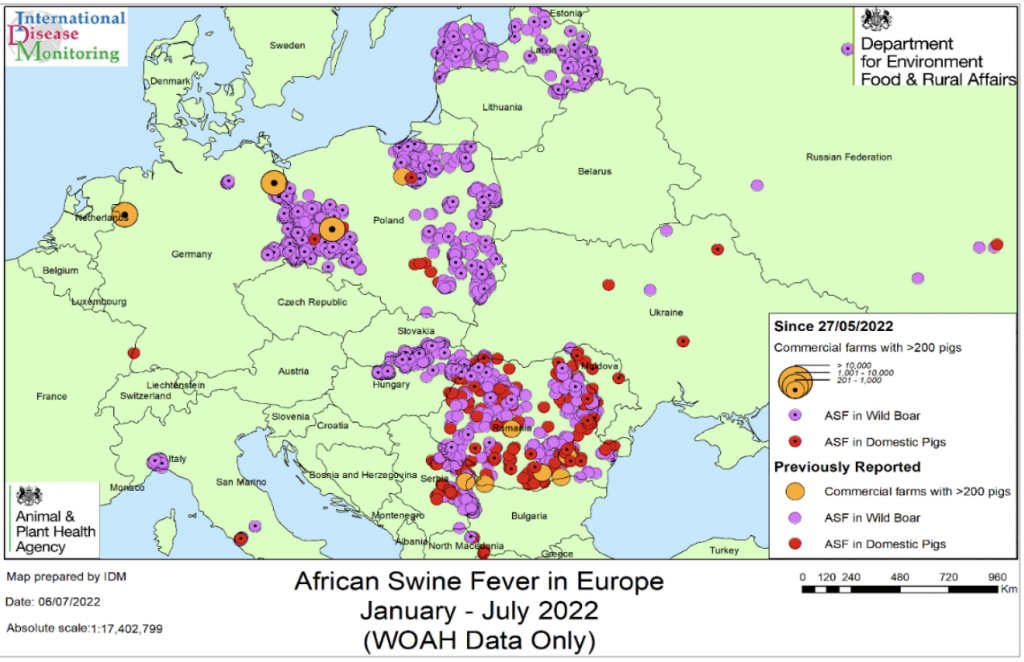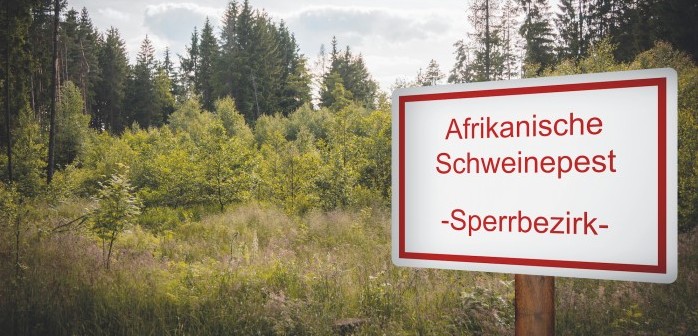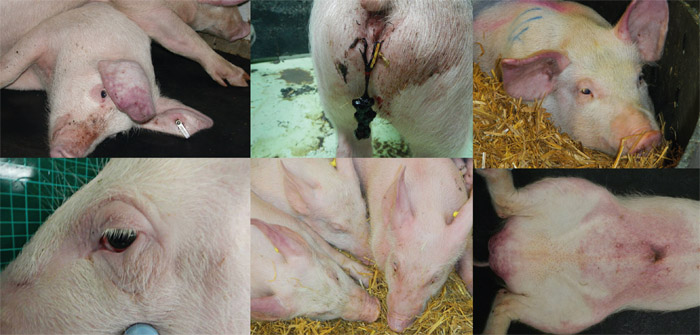The Government has increased the UK’s African swine fever (ASF) risk status in response in response to worrying new outbreaks in Germany, sparked by human spread.
The virus has recently been confirmed in domestic pigs in a new region of Germany, in Emsland, Lower Saxony, roughly 15km from the Netherlands border. Located in an area with a high density of pig farms, this is approximately 300km from the nearest reports in wild boar in Mecklenberg-Vorpommen and 500km from the recently reported outbreak in domestic pigs in the south of the country, close to the French border.
A further outbreak in the eastern state of Brandenburg, where the disease has been previously reported in wild boar and domestic pigs, was also detected on a holding of 1,300 fattening pigs.
“This report in northwest Germany represents another significant jump for ASF and serves as an important reminder of the ability of ASF to spread long distances to a previously unaffected region, often via human-mediated routes, as was observed in Belgium in 2018 and more recently in north-western and central regions of Italy, in southwest Germany near the French border and further afield,” APHA said in its latest update on ASF in Europe.
Commenting on the implications of this continued human spread of the virus for the UK pig herd, the agency said these latest two cases in Germany represent new ‘jumps’ in disease distribution which is the fifth such event in Europe in the last two months.

“This is concerning as it would appear that none of these cases have arisen as a result of the movement of infected pigs or wild boar. Instead, the other likely pathways are human mediated transport of infected products or contaminated equipment/products (fomites). This is confirmed by the genotyping of the virus from the new outbreaks and the epidemiological investigations.
“Therefore, while we consider the overall risk of entry of ASF virus into the UK from all combined pathways remains at medium. Because of the regular detection of outbreaks and wild boar cases in new areas as a result of human-mediated routes, this particular pathway is now considered to be HIGH.
“There is considerable uncertainty as the movement of people into the UK at present is affected by travel disruption, fuel prices and reducing seasonal worker numbers.”
Border controls
NPA senior policy adviser Rebecca Veale said the APHA assessment highlights the need for the Government, which has scrapped plans to introduced checks on EU imports from July 1, to improve its border controls and for producers to step up their biosecurity and be extra vigilant for signs of ASF.
“The greatest threat has always been entry of ASF virus into the UK via humans due to the checks in place for live animals and legal imports so whilst the overall risk of entry of ASF virus into the UK from all combined pathways remains at medium, this new status is of huge concern and demonstrates how vulnerable the UK is to this disease,” she said.
“NPA has been calling for greater controls at UK borders for some time and was hugely disappointed and worried when the checks which were due to come into force in July 2022 were postponed. Having written to the Prime Minister and raised concerns at every opportunity, there has been little action to better protect the national pig herd.
“Producers must continue to practice high levels of biosecurity to mitigate any risk and NPA is planning wider communications to producers, wider industry and seasonal workers.”
“The political lobby will also continue and the team hope to make the most of the summer recess when MPs often visit producers to get the message across again. If you have an MP meeting or farm visit planned then please get in touch.”
Commercial consequences
The British Meat Processors Association (BMPA) pointed out that any farm where an infection occurs would mean the entire herd being culled, regardless of how many animals are affected.
On a wider scale, the arrival of ASF would cause an immediate ban on UK pork exports to some of our biggest international trading partners, including China, causing a significant drop in meat exports and costing the industry millions in lost trade.
Technically, inbound visitors to the UK are no longer allowed to bring in food items post-Brexit, however this rule is currently being waived and there is still little or no signage at ports of entry informing people of the new rules, the association said.
BMPA CEO Nick Allen said: “We are calling on the government to make travellers more aware of the risks of bringing prohibited food items into the UK and to encourage them to dispose of those products responsibly before entry. We would also like to see spot checks introduced as a further measure to improve biosecurity.”
“These measures alone won’t completely insulate Britain from African Swine Fever, but any additional measures would be better than the open border policy currently that is currently in place.”
APHA ASF advice
While it is not illegal to bring in pork products from the EU, all travellers are strongly advised to avoid bringing or ordering any pork product, including dried or cured meats, sausages, salamis, or pâté, back to the UK from affected parts of Europe.
Travellers from Asia and other third country areas who bring meat or dairy products can face prosecution and a large fine.
Advice to pig keepers
- All pig keepers must ensure pigs are not fed catering waste, kitchen scraps or pork products, thereby observing the swill feeding ban.
- All pig keepers should remain vigilant and ensure any visitors or seasonal workers have not had any recent contact with pigs, pig products, pig premises, wild boar (including hunting) or equipment associated with such activities in the affected regions in Europe or the world.
- Proper training on this should be provided.
- Pig keepers and vets should remind themselves of the clinical signs for ASF.
- Any suspect cases must be reported promptly by calling, in England – 03000 200 301, in Wales – 0300 303 8268 and, in Scotland – your local Field Services Office.
- See www.gov.uk/guidance/african-swine-fever for more information.
Symptoms
The main clinical signs are:
- fever
- loss of appetite
- lack of energy
- sudden death with few signs beforehand.
Other signs can include:
- vomiting
- diarrhoea
- red or dark skin, particularly on the ears and snout
- discharges from the eyes and nose
- laboured breathing and coughing
- abortion in pregnant sows
- weakness
- unsteady gait.





